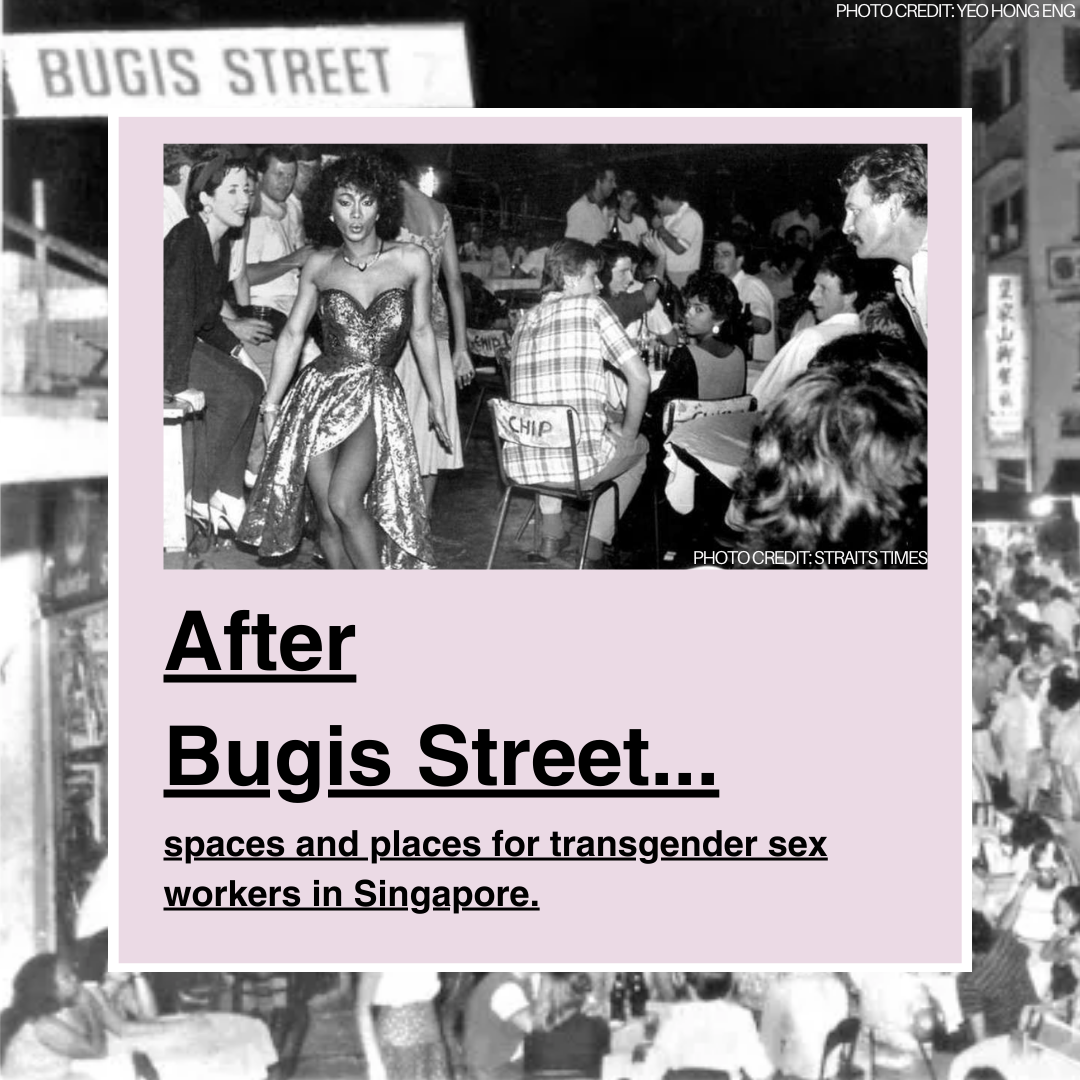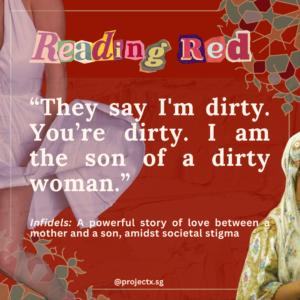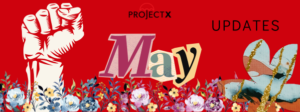1.1 History of Bugis Street:
Bugis Street is often touted as one of the many go to places in Singapore for cheap trendy clothes and delicious delicacies today. Right below the refurbished pavement of Bugis Square, lies the remnants of the original Bugis Street, internationally renowned for being a glorious haven for the trans community in the 1950. The end of the second world war signalled the resurgence of prosperity for Bugis Street. By night, Bugis was a thriving red light district, catering to the British troops and later on, the American forces during the Vietnam War. Bugis’ reputation as a hub for night time festivities was greatly boosted when it became a gathering place for members of the transgender community.
Bugis Street was soon a victim of redevelopment in the 1980s. Citing reasons such as poor sanitation and prime locations that were too juicy to pass up on, the Singapore Government expressed interest in redeveloping the land that Bugis Street and its neighbours occupied. (Nguyen, 2017). This led to the relocation of sex workers to the Lorongs of Geylang and Orchard Road (Aleshire, 1985).
The Vice Squad was created by the government to evict transgender sex workers from Bugis Street. On 22 August 1980, police officers were stationed around Bugis to arrest any transgender sex worker and take down their particulars. The latter were told to confine their activities within the vicinity of Geylang, or face booking and further charges in court. The authorities justified their “clean up” operation with discriminatory claims that transgender persons were predisposed to crime and that they “were of no good to society” (The Straits Times, 1980).
Bugis was more than just a place for work and entertainment, it was also a safe haven for the trans community. A space for freedom of identity, a place to be who you are and a meeting point for other people of transgender experience. The upheaval of Bugis Street and forceful relocation of its sex workers, meant that transgender folks were no longer welcome there. With the heavy policing of transgender sex work by the government and the absence of a proper support network and community for transgender sex workers, cases such as assault and theft would often go by unseen.
1.2 Implications of the redevelopment of Bugis Street:
The relocation of transgender sex workers from Bugis to Geylang and Orchard Road in the 80s made survival difficult. However, the community soon found themselves working in places that were highly accessible. Such locations also had distinct features that allowed it to remain unsuspecting to the untrained eye, hiding them from the watchful eye of the law (Lay, 2017).
The relocation of transgender sex workers to Geylang in the 1980s may not seem like that big of a deal, given that Geylang is famously known for brothels that have been licensed and regulated by the government using the yellow card system. With section 377A’s prohibition of homosexual activity, pre- or non-operative transgender sex workers are unable to work in licensed brothels, thus often turning to street-based sex work, or freelancing online (Project X, 2015). This restriction not only impairs the working opportunities of transgender women but also limits their access to proper services such as good access to condoms and screening services for both STIs and HIV (AWARE, n.d.).
Furthermore, street-based workers sometimes do not have a community or support network to rely on when things go astray. Unlike brothel-based workers, oftentimes freelance sex workers do not receive any help when they face abuse or assault from their clients. Transgender sex workers who take it on themselves to engage in safer sex with their own condoms often face criminalisation by the police who use these condoms as evidence of solicitation and “unlicensed” sex work. This further discourages the use of condoms and safe sex, which places transgender sex workers in an unnecessarily vulnerable position (Ho, 2012).
1.3 Present day Singapore and transgender sex work:
Other than Orchard Road and Geylang, transgender sex workers have navigated a range of places and establishments for work, each with their own unique culture and historical backgrounds. These places include but are not limited to Desker Road, Woodlands Town Garden and Changi Village.
Desker Road is home to shophouses that house trangender sex workers, allowing them to work from inside, without actively breaking the solicitation law. However, the once bustling atmosphere around the vicinity of Desker Road and Rowell Road has now diminished, due to police crackdowns and the redevelopment of the area around Mustafa center (Lay, 2017) However post-Covid, Desker Road has recently been showing signs of a gradual recovery.
Woodlands Town Garden is a 11 hectare heartland park tucked away in the corner of Marsiling, which has an overnight car park area for lorries and trucks. The garden was a workplace for Singaporean and Malaysian transgender sex workers. To these workers, the garden was a much better alternative compared to Changi Village which was often too far and too crowded to conduct business. Here, transgender sex workers attracted a general clientele of foreign workers. However, in 2015, current President Halimah Yacob, then a newly elected MP pledged to clean up Woodlands Town Garden due to residents expressing great discomfort with its nightly activities (Cheong, 2015). This is regrettable, as many of the transgender sex workers in the gardens were also residents of Woodlands, but their needs for a source of income was somehow deemed less important than the discomfort of others. This inevitably led to the decline of Woodlands Town Garden as an area for Transgender sex workers to work in.
Changi Village is a little space found along the east end of Singapore, which used to be a sanctuary for transgender sex workers from the 1990s. Trans women of Changi Village recounted the heydays where there were traffic jams around the carpark caused by men queuing up to engage the services of transgender sex workers. However, with redevelopment (the construction of the civil service club), its remoteness and the effects of Covid-19, the decrease in foot traffic and business in Changi Village has made it a shadow of what it once was.
1.4 Future of street-based sex work for transgender women:
While change is the only constant in Singapore, it is worth highlighting trans-specific spaces that have been targeted for erasure by virtue of them being sanctuaries for transgender sex workers. With these havens for the trans sex worker community vanishing, what further actions have to be taken, to ensure that the rights and wellbeing of the trans sex worker community can be protected?
Perhaps we can take inspiration from countries like the Netherlands who have a specially dedicated zone for transgender sex workers (Blue light district) or Denmark where anti discriminatory laws are heavily enforced. While it is critical for trans women to not feel that sex work is their only way to make a living, it is equally important for those who feel that sex work is their best opportunity are given a safe space to do so.
Interview with Sherry on her thoughts on the transgender sex work industry.
Reference List:
- The Straits Times (1864) THE SOCIAL EVIL. Page 1. [Article] Available at https://eresources.nlb.gov.sg/newspapers/Digitised/Article/straitstimes18640618-1.2.3
- Ngyuen, L. (2017) The Bugis street cluster – a morphogenetic narrative. Available at https://www.academia.edu/38560204/Ly_Nguyen_The_Bugis_street_cluster_a_morphogenetic_narrative
- Aleshire, I. (1985, February 6). Study on bugis street gives hawkers reprieve. The Straits Times, p. 44. Available at https://eresources.nlb.gov.sg/newspapers/Digitised/Article/straitstimes19850206-1.2.74
- Aleshire, I. (1985b, July 13). Bugis street stalls must go — it’s final. The Straits Times, p. 9. Available at https://eresources.nlb.gov.sg/newspapers/Digitised/Article/straitstimes19850713-1.2.22.1
- Bugis street to be cleared of transvestites. (1980, August 23). The Straits Times, p. 8. Available at https://eresources.nlb.gov.sg/newspapers/Digitised/Article/straitstimes19800823-1.2.37
- Lay, B. (2017, December 14). Why do desker road & rowell road have brothels with transgender prostitutes? Mothership. Retrieved June 16, 2023, from https://mothership.sg/2017/12/desker-rowell-road-prostitutes-singapore/
- Project X. (2015). (rep.). “They Only Do This to Transgender Girls” Abuses of Transgender Sex Workers in Singapore (p. 12). Available at https://law.yale.edu/sites/default/files/area/center/schell/they-only-do-this-to-transgender-girls-singapore-report-final.pdf
- Aware: Women’s action. Aware| Women’s Action. (n.d.). https://www.womensaction.sg/article/migration
- Ho, V. (2012). (rep.). The Right to Sexual Health: A Case of Streetwalkers in Singapore. Retrieved June 2023, from https://theprojectx.org/wp-content/uploads/2022/10/The-Right-to-Sexual-Health-full-article.pdf.
- Cheong, D., & Aw, C. W. (2015, October 11). MP Pledges to Clean up Sleazy Woodlands Park. Retrieved June 2023, from https://www.asiaone.com/singapore/mp-pledges-clean-sleazy-woodlands-park






